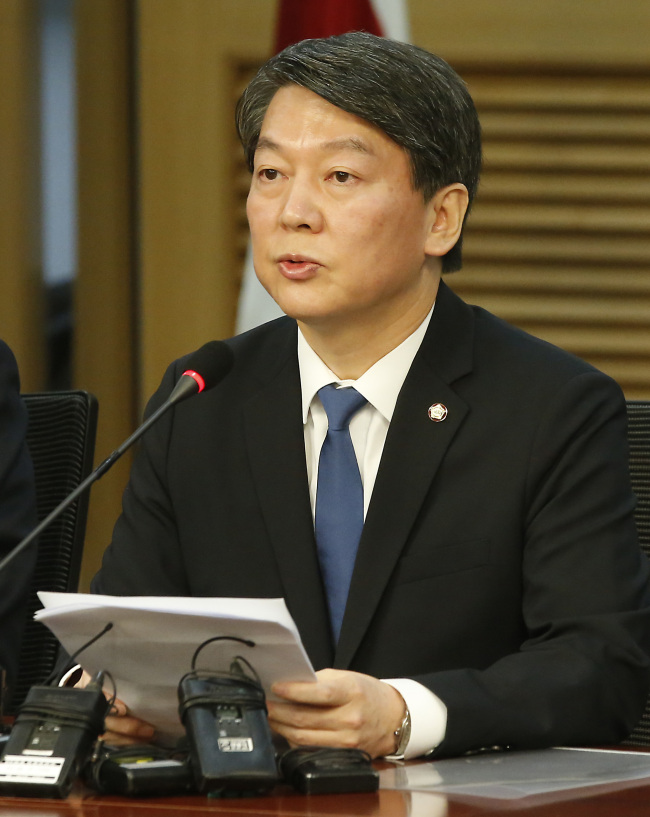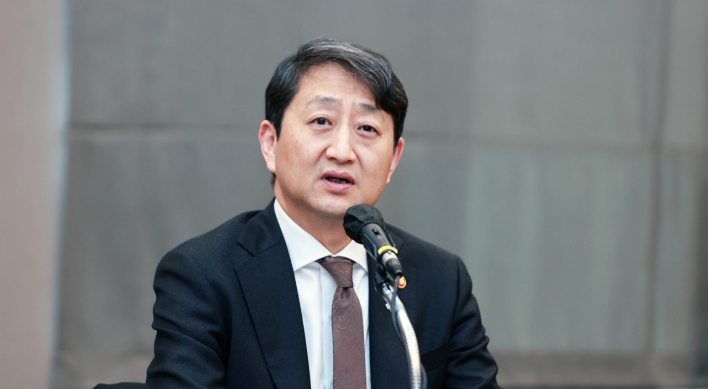Former opposition presidential candidate Rep. Ahn Cheol-soo on Monday announced his plan to form a new party by early February and pledged to build a robust opposition bloc to eventually form the next administration.
“I have so far failed to meet the people’s expectations to change politics and the nation,” said Ahn in a televised press conference. “I owe it to the people and my supporters. The only way to repay the debt is to achieve a change of government and practice new politics that transforms people’s lives.”
With some dissenting opposition lawmakers weighing the option to join Ahn, who bolted from the main opposition New Politics Alliance for Democracy on Dec. 13th, his new party is aiming to emerge as a third party in the April 13 general elections.
“I have so far failed to meet the people’s expectations to change politics and the nation,” said Ahn in a televised press conference. “I owe it to the people and my supporters. The only way to repay the debt is to achieve a change of government and practice new politics that transforms people’s lives.”
With some dissenting opposition lawmakers weighing the option to join Ahn, who bolted from the main opposition New Politics Alliance for Democracy on Dec. 13th, his new party is aiming to emerge as a third party in the April 13 general elections.

While Ahn dismissed the possibility of merging with the NPAD in the run-up to the elections, the businessman-turned-politician highlighted that he would join forces with the NPAD dissenters who had already left the party.
A total of seven NPAD lawmakers have left the party since its leader Rep. Moon Jae-in took the helm in February. Among them, Reps. Moon Byeong-ho, Yoo Sung-yop, Hwang Ju-hong and Kim Dong-cheol quit the party in the wake of Ahn’s defection. They flanked Ahn at the press conference to show their support.
The four dissenters expected that several more dissenting lawmakers would follow them, noting that Ahn’s burgeoning popularity in opinion polls would encourage the lawmakers to join Ahn’s camp -- particularly those representing the NPAD stronghold of South Jeolla province.
“I think one or two NPAD lawmakers will leave this week,” said Moon Byung-ho. “I think (the NPAD lawmakers) are agonizing over their next move because Ahn’s approval ratings among voters in the Jeolla provinces has been soaring. The region will emerge as the center of a typhoon,” he added.
Among the eight seats in Gwangju, the capital city of South Jeolla Province, the number of seats held by the NPAD was reduced to five as Reps. Chun Jung-bae, Park Joo-sun and Kim Dong-chul left the party. The remaining five are reportedly considering following suit, except for Rep. Kang Gi-Jung.
By region, Ahn’s new party recorded the highest approval rating of 31 percent in Gwangju in a survey conducted by local pollster Realmeter on Monday. The polls showed that Ahn’s future party’s approval rating came in at third with 16.3 percent, following the NPAD’s 25.7 percent and the Saenuri Party’s 38.2 percent.
While setting his new party’s objective of winning the 2017 presidential elections, Ahn vowed to create a third opposition group that can prevent the Saenuri Party from gaining more than 200 seats, the mark for an overwhelming majority in the Assembly, in the 2016 general elections.
Observers noted that the fate of Ahn’s new political party would determine whether the third party would succeed in South Korea’s political landscape, where two major parties have mostly enjoyed supremacy against independents attempting to create a third party.
Except for the late President Kim Dae-jung’s defection from the then-main opposition Democratic Party in 1995 -- he had created his own party, National Congress for New Politics, and emerged as the biggest opposition in the 1995 general elections -- the defectors’ attempt to replace the main opposition have failed.
“Ahn’s new party will serve as a watershed moment for the Korean political system; whether it can transition from a two-party system to a multiparty system,” said Choi Jin, the chairman of the Institute of Presidential Leadership.
“Due to the legacy of the military dictatorship, third parties have struggled to establish themselves and ended up being minor parties. But things have been changing in favor of the creation of a third party, as diverse voices are springing up in the pluralist Korean society,” said Choi.
Other observers, such as Kim Jong-in, the former senior presidential secretary for economic affairs who lured Ahn into politics in 2011 when Ahn became popular among young voters, dismissed the possibility that Ahn’s new party would emerge as a significant political group in the elections.
“In politics, image is not everything. I think Ahn has proved nothing since 2011. His new party would gain some seats in the South Jeolla Province and Seoul metropolitan areas. But the election would ultimately come down to the rivalry between the Saenuri Party and the NPAD,” said Kim in a media interview.
By Yeo Jun-suk (jasonyeo@heraldcorp.com)



![[AtoZ Korean Mind] Does your job define who you are? Should it?](http://res.heraldm.com/phpwas/restmb_idxmake.php?idx=644&simg=/content/image/2024/05/06/20240506050099_0.jpg&u=)














![[K-pop's dilemma] Is Hybe-Ador conflict a case of growing pains?](http://res.heraldm.com/phpwas/restmb_idxmake.php?idx=642&simg=/content/image/2024/05/07/20240507050746_0.jpg&u=)